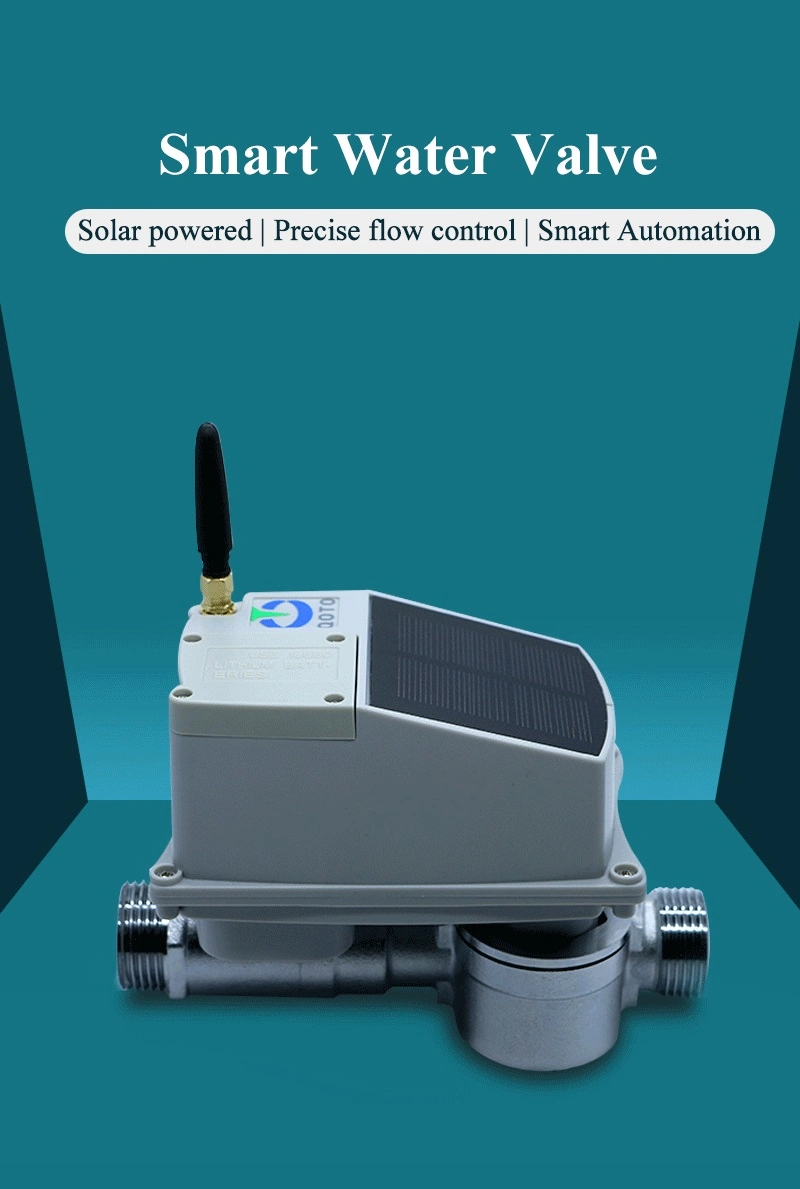Basic Info.
Model NO.
QT-01F
Drainage & Irrigation Mode
Sprinkler Irrigation Equipment
Pump Type
Centrifugal Pump
Material
Metal
Ground Drainage and Irrigation Machinery Type
Siphon Irrigation
Certification
CCC, CE
Condition
New
Application Field
Agriculture
Pressure
1.6MPa
Flow Meter
Built-in Meter
Communication Protocol 1
4G
Communication Protocol 2
Lora
Pipe Size
DN25mm
Transport Package
Gift Box
Specification
17.3*7.9*19.9cm
Trademark
QOTO
Origin
China
HS Code
8501310000
Production Capacity
100000PCS/Year
Product Description
Product introduction
Smart water valve
* solar powered
*precise flow control
*Smart Automation

Make Irrigation Easier



what other products DIY sprinkler irrigation system need



| Model | specification | configuration | |
| QT-01F-N/L/G | Power supply | DC 5V 2A(solar panel+18650 battery 1pcs or 2pcs) | smart valve controller+1 inch valve*1 |
| communication protocol | Lora/NB-iot/4G | ||
| protection level | IP67 | ||
| Working Temp | -20~75ºC | Flow Meter--DN25 | |
| Media Temp | 0~70ºC | ||
| valve caliber | DN25 | ||
Smart water valve
* solar powered
*precise flow control
*Smart Automation

Make Irrigation Easier
*Systematic
*Intelligent
*Safe
*Control Water Consumption
*Precise Irrigation
*Solar Powered
*Cable-free installation

*Remote control
*Flow control
*Cycle control
*Water statistic
*Delay Control
*Timing Program
*Water Shortage alarm
*Fault alarm
*User Log
*Solar Powered
*Group Manage
*Intelligent Linkage
*Intelligent
*Safe
*Control Water Consumption
*Precise Irrigation
*Solar Powered
*Cable-free installation

*Remote control
*Flow control
*Cycle control
*Water statistic
*Delay Control
*Timing Program
*Water Shortage alarm
*Fault alarm
*User Log
*Solar Powered
*Group Manage
*Intelligent Linkage




what other products DIY sprinkler irrigation system need

SPRINKLER SYSTEM PLANNING 
Plot, Plan, and Design
1. The first step in designing a residential system is to
measure the property and indicate the location of
the house. On a separate piece of paper, sketch out
your property and place your measurements on the
sketch. Be sure to include all concrete or brick walks
and patios, driveways, and fences. While you are
measuring, locate any trees, shrubs, and lawns and
draw them on the sketch.
measure the property and indicate the location of
the house. On a separate piece of paper, sketch out
your property and place your measurements on the
sketch. Be sure to include all concrete or brick walks
and patios, driveways, and fences. While you are
measuring, locate any trees, shrubs, and lawns and
draw them on the sketch.

Draw Sprinkler Head Locations
Decide where you will be installing large area sprinklers and where you will be installing small area sprinklers. Large area sprinklers
should be 25' to 40' apart. Small area sprinklers should be 8' to 17' apart. This spacing will allow spray patterns to overlap and
assure even water distribution. Do not mix sprinkler types within one area. Do not place sprinkler heads too far apart; stay
within specifications listed on the Sprinkler Performance Charts, which can be found in the Hunter Product Catalog. Spacing is
determined by the size of the area the sprinkler is serving. Additionally, a sprinkler should be spaced so that it will spray both the
head next to it and the head across from it. Working with one area at a time, start placing sprinkler heads: 

Step 1
The critical points on a plan
are the corners. Draw a
quarter pattern sprinkler
in each corner. Using a
compass, draw an arc
showing the sprinkler's
watering pattern.

Step 2
If the quarter heads will not
spray each other (head-to-
head spacing), place heads
along the perimeters. Draw
these sprinklers' watering
patterns.

Step 3
Now look to see if the perimeter heads will be spraying
across the area to the heads on the other side. If they do
not, add full circle heads in the middle. An easy way to locate
these heads is to draw perpendicular grid lines from one
perimeter head to another. Again, using the compass, draw
an arc showing this sprinkler's watering pattern to make sure
there is complete coverage.

Curved Areas
Convert curved areas to a series of straight lines; place
sprinklers the same as you would in square or rectangular
areas. Adjustable arc nozzles on spray heads work very well
in curved areas.

